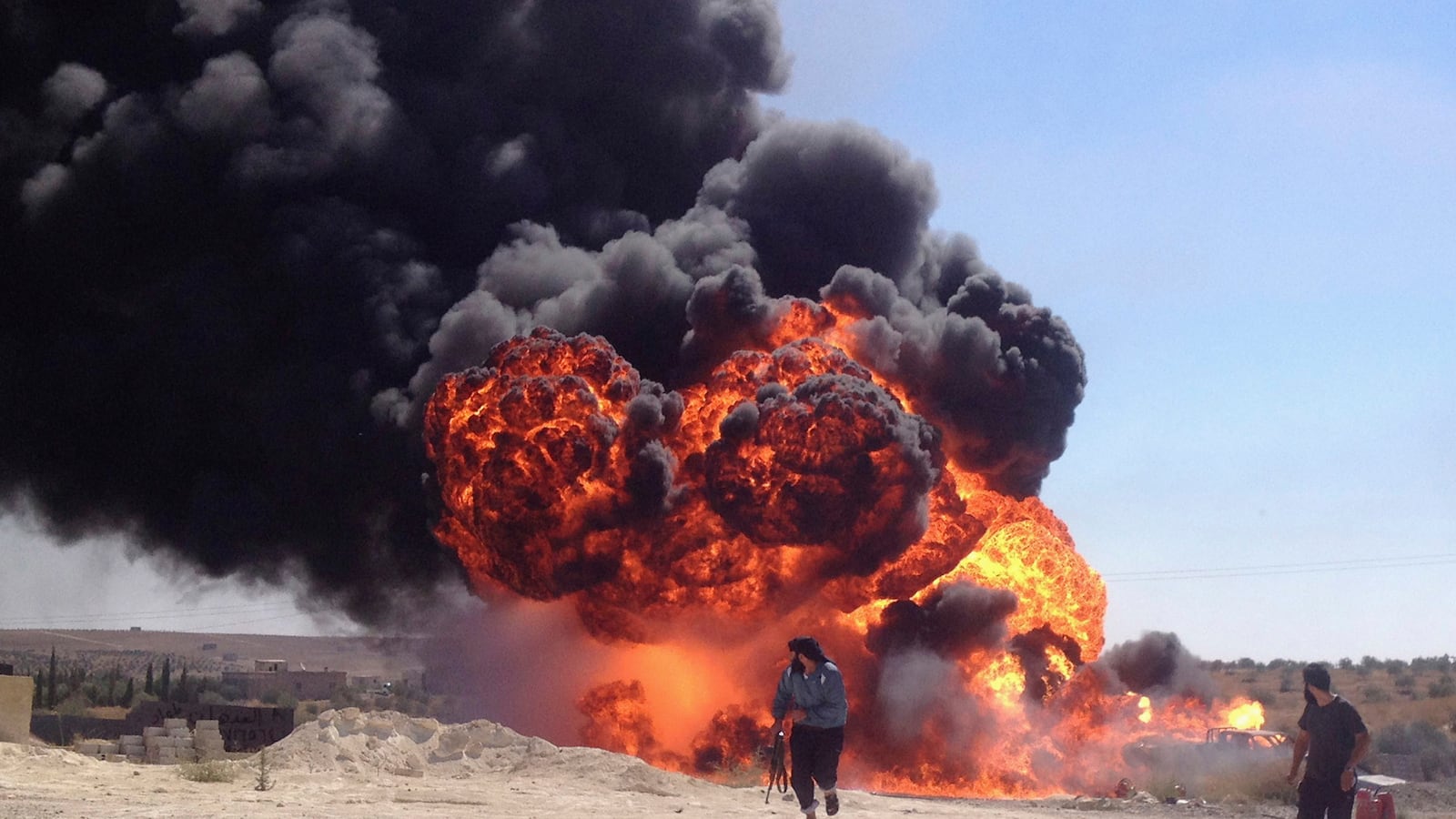A human rights group has accused the Syrian government of using fuel-air bombs earlier this week in an air raid on a high school in the rebel-held city of Raqqa in the north of the country. Such arms, also known as “vacuum bombs,” are considered as lethal as chemical weapons, and at least 16 people were killed in the strike—many of them teenagers attending their first day of classes after the summer vacation.

The airstrikes on Sunday also reportedly wounded another 25 civilians, and took place just before a team of international weapons experts arrived in Syria as part of the disarmament process.
“While the world tries to bring Syria’s chemical weapons under control, government forces are killing civilians with other extremely powerful weapons,” said Priyanka Motaparthy, a researcher at Human Rights Watch.
Fuel-air bombs are not under the jurisdiction of the disarmament experts from the Organization for the Prohibition of Chemical Weapons (OPCW) who on Monday arrived in Syria where they will be working under the terms of a Russian-brokered chemical weapons deal that averted U.S. military action last month.
Vacuum bombs are not considered chemical weapons as they don’t unleash nerve agents or toxic gases. They don’t explode on impact but detonate in midair, using a chemical reaction with the air to generate an intense, high-temperature explosion, and a cloud of burning fuel. The blast wave they generate is significantly longer in duration and sometimes more powerful than that of conventional explosives. The U.S. first developed vacuum bombs for use in Vietnam, and the Russians used them in Afghanistan and Chechnya. Military analysts say the vacuum bombs dropped on Monday were likely Russian-supplied and from the ODAB-series of fuel-air bombs.
A study by the U.S. Defense Intelligence Agency in 2000 said fuel-air blasts can “prove as lethal” to people “caught within the (burning fuel) cloud as most chemical agents.”
Human Rights Watch says that based on eyewitness accounts and videos, there is little doubt that fuel-air bombs were used in the attack. A doctor from Raqqa’s National Hospital said he saw a dozen bodies, most of them students, and the hospital treated 25 wounded. HRW researchers say the blast wounds and flash burns visible on victims in videos and photographs combined with body positions and the small amount of shrapnel wounds indicates the use of fuel-air explosive.
That is consistent with a description of the weapon’s effect in the U.S. Defense Intelligence Agency study. “The kill mechanism against living targets is unique and unpleasant. What kills is the pressure wave, and more importantly, the subsequent [vacuum], which ruptures the lungs. If the fuel deflagrates but does not detonate, victims will be severely burned and will probably also inhale the burning fuel.”
Raqqa residents say a government warplane dropped two bombs on the courtyard of the Ibn Tufail Commercial Secondary School just as school had begun at about 8:05 a.m. “The Raqqa bombing is the latest in a long string of government attacks that hit schools and killed students,” HRW’s Motaparthy says. “These attacks have cost many children their lives, and have taught others that they risk death by going to school.” In many villages in rebel-held areas, families are too scared to send their children to school for fear they may come under an airstrike.
An opposition activist told Human Rights Watch that he arrived minutes after the attack. “We heard the sound of a plane at exactly 8 a.m., and after a few seconds we heard the explosions. We went to the site after we identified it by the smoke rising from the scene. We got there after four to six minutes. Corpses were strewn on the ground and people were in a state of severe panic.”
When the chemical weapons deal was struck last month, rebels and opposition leaders warned that Assad would see it as a green light to continue to use conventional weaponry with impunity. At the time, they noted that chemical weapons had killed only a few out of the more than 100,000 slain so far in the civil war.
Syrian government forces have reportedly used vacuum bombs before. One such attack took place in April, when forces struck the rebel-held town of Al Bab northeast of Aleppo. But this is the first documented use of such weapons since the chemical weapons deal was struck.






